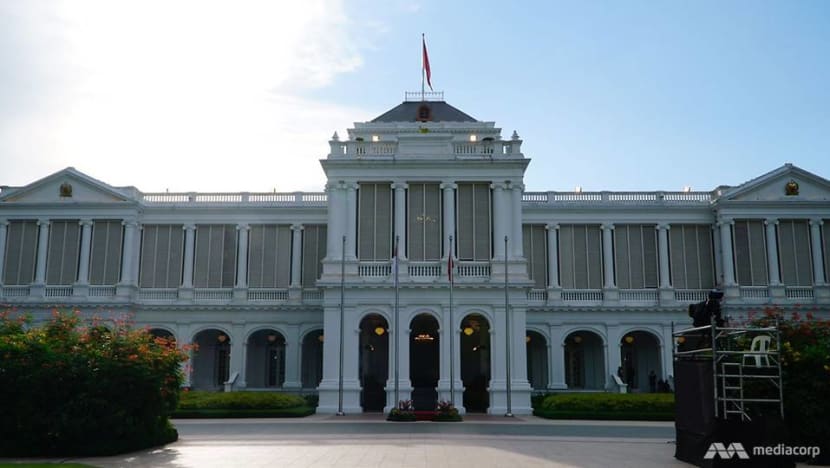CNA Explains: What you need to know about Singapore's upcoming Presidential Election
Madam Halimah Yacob will not stand for re-election when her term expires on Sep 13.

The Istana. (File photo: CNA/Howard Law)
SINGAPORE: President Halimah Yacob announced on Monday (May 29) that she would not be running for a second term, ruling her out of an election that will take place in a few months' time.
This year's election will be an open one, which means that candidates of all races will be able to apply. The 2017 poll was a reserved election, in which only members of the Malay community were allowed to contest.
Here's what we know so far:
WHEN WILL THE ELECTION BE HELD?
Singapore's next Presidential Election must be called by Sep 13, with Mdm Halimah's six-year term expiring on that day.
The earliest the election can be held is three months before that - on Jun 13.
The process begins when Prime Minister Lee Hsien Loong issues the Writ of Election - a public document that marks the start of an election.
Once issued, ELD will announce the date, time and place where Nomination Day submissions will be held.
Prospective candidates who wish to contest in the election must apply to the Presidential Elections Committee (PEC) for a certificate of eligibility and submit a community declaration to the Community Committee (CC).
The community declaration is needed to calculate when the next reserved election will be.
WHO QUALIFIES AS A PROSPECTIVE CANDIDATE AND HOW DO THEY NOMINATE THEMSELVES?
Candidates, who must be at least 45 years old, will need to satisfy the PEC that they are a "person of integrity, good character and reputation" and must also meet the relevant public sector or private sector service requirements.
To fulfil the public sector condition, presidential candidates must have held office - for at least three years - as a minister, chief justice, Speaker of Parliament, attorney-general or permanent secretary among others.
Chief executives of key statutory boards or government-owned companies like Temasek also qualify.
Meanwhile, private sector candidates must have served for at least three years as chief executive of a company that has at least S$500 million (US$370 million) in shareholders' equity and has made profit after tax throughout those three years.
On Nomination Day, prospective candidates must present their nomination papers and certificates to the returning officer in person at the nomination centre between 11am and 12pm.
A Returning Officer is an individual who has been appointed by the Prime Minister to oversee the impartial and smooth conduct of elections.
If only one candidate is successfully nominated, the Returning Officer will declare that person as the elected president.
If more than one candidate is successfully nominated, a poll must be conducted.
The campaign period starts on Nomination Day, immediately after the conclusion of the nomination proceedings. It will end at the start of what is called "Cooling-off Day" - which is the eve of Polling Day.
During this time, campaigning is prohibited so as to give voters time to reflect on issues raised during the election before going to the polls.
HOW DO I VOTE?
Voting is compulsory for Singaporeans aged 21 and above. If your name has been struck off the Register of Electors for not having voted in a previous election, you may apply via the Elections Department website to restore your name.
No restoration can be made once the Writ of Election has been issued.
If the election is contested, you will receive your poll card by post at your registered residential address, two to three working days after Nomination Day.
On Polling Day, you will need to take your poll card and NRIC to your designated station. You can cast your vote between 8am and 8pm on that day.
After polls close, the ballot boxes will be transported to the counting centres. The Returning Officer will announce the outcome of the poll after the count is completed.
ELD announced on Jul 24 that the number of polling stations will be increased to 1,264, up from 1,097 in the 2020 General Election. This will lower the number of voters allocated to each station from an average of 2,400 to 2,150.
Polling stations will also have more registration and ballot paper counters to reduce voters' waiting times. The number of active election officials is also expected to increase from 30,000 to 36,000.
Voters will also have a more convenient way to check the queue status at polling stations by accessing the VoteQ link via their ePoll card on the Singpass app and on ELD's website. They can also scan the QR code on their poll card.
ELD is also replacing the X-pen, which was introduced in GE2020, with the X-stamp. ELD said that most voters used the X-pen correctly – by stamping it on the ballot paper – but some voters mistook the X-pen to be an actual pen and tried to write a cross with it.
To avoid any confusion, the X-stamp is “wider and more clearly intended to serve as a stamp”, said ELD.
WHAT ABOUT VOTERS OVERSEAS AND IN NURSING HOMES?
The upcoming election will also feature new voting arrangements, following changes to Singapore's election laws that were passed in Parliament in March.
As part of a pilot involving around 25 to 30 nursing homes, polling stations will be set up on-site and mobile polling teams may be deployed to bring the ballot boxes and papers to voters who are bed-bound.
This comes after ELD said last May that it was collecting feedback from stakeholders including nursing home operators on introducing special voting arrangements to improve voting accessibility.
Meanwhile, eligible Singaporeans living overseas will be able to vote by post for the upcoming election.
Overseas Singaporeans who have registered for postal voting can log in to the ELD website the day after Nomination Day to print the postal ballot paper and return envelope if the election is contested.
The return envelopes containing postal ballot papers as well as boxes containing ballot papers cast at overseas polling stations will be transported back to Singapore for counting after Polling Day.
The envelopes and boxes must reach the custody of the Returning Officer in Singapore no later than 10 days after Polling Day.
ELD also said in July that those living in the following regions should consider affixing postage stamps on their return envelopes to ensure that it will be postmarked by the foreign postal services:
- Middle East: Israel, Oman, Saudi Arabia, Türkiye and the United Arab Emirates
- Oceania: Australia and New Zealand
- Southeast Asia: Cambodia, Indonesia, Laos, Thailand and Vietnam
- Others: Bangladesh, Belgium, Brazil, Ghana, India, South Korea and Taiwan
Overseas Singaporeans who choose to vote in person are able to do so at one of the 10 overseas polling stations: New York, Washington DC, San Francisco, London, Shanghai, Beijing, Hong Kong, Tokyo, Canberra and Dubai.
If the number of overseas voters has no "material impact" on the election outcome, the Returning Office will declare the candidate who receives the highest number of votes to be elected, says ELD.
An example is if the total number of overseas votes is smaller than the difference between the number of local votes polled for the top two candidates.
However, if there is a material impact, the Returning Officer will announce the number of votes cast in Singapore in favour of each candidate and will defer the declaration of the candidate elected, until after the overseas votes are counted.




















